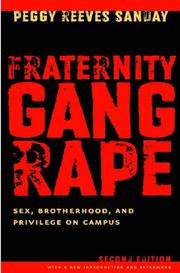| Listing 1 - 10 of 12 | << page >> |
Sort by
|
Periodical
Abstract | Keywords | Export | Availability | Bookmark
 Loading...
Loading...Choose an application
- Reference Manager
- EndNote
- RefWorks (Direct export to RefWorks)
Greek letter societies --- Greek letter societies. --- College fraternities --- College sororities --- Fraternities --- Sororities, Greek letter --- Societies
Book
ISBN: 1469605961 0807888702 9780807888704 9781469605968 9780807832530 0807832537 9780807859315 0807859311 9798893132540 Year: 2009 Publisher: Chapel Hill : University of North Carolina Press,
Abstract | Keywords | Export | Availability | Bookmark
 Loading...
Loading...Choose an application
- Reference Manager
- EndNote
- RefWorks (Direct export to RefWorks)
Here is the first book to recount the full history of white college fraternities in America. Nicholas Syrett traces these organizations from their days in antebellum all-male schools to the sprawling modern-day college campus, paying special attention to how fraternity brothers have defined masculinity over the course of their 180-year history. Based on extensive research at twelve different schools and analyzing at least twenty national fraternities, The Company He Keeps explores the formation of what Syrett calls ""fraternal masculinity.""
Masculinity --- Male college students --- Greek letter societies --- Masculinity (Psychology) --- Sex (Psychology) --- Men --- Men college students --- College students --- College fraternities --- College sororities --- Fraternities --- Sororities, Greek letter --- Societies --- History. --- History
Periodical
ISSN: 23291230 Year: 1915 Publisher: Effingham, Kan. : Phi Delta Kappa,
Abstract | Keywords | Export | Availability | Bookmark
 Loading...
Loading...Choose an application
- Reference Manager
- EndNote
- RefWorks (Direct export to RefWorks)
Education --- Greek letter societies --- Education. --- Greek letter societies. --- College fraternities --- College sororities --- Fraternities --- Sororities, Greek letter --- Children --- Education of children --- Education, Primitive --- Human resource development --- Instruction --- Pedagogy --- Schooling --- Students --- Youth --- Societies --- Civilization --- Learning and scholarship --- Mental discipline --- Schools --- Teaching --- Training

ISSN: 01698958 ISBN: 9789004150805 9004150803 9786611398972 1281398977 904740937X 9789047409373 9781281398970 9789047409373 661139897X Year: 2006 Volume: 277. Publisher: Leiden Brill
Abstract | Keywords | Export | Availability | Bookmark
 Loading...
Loading...Choose an application
- Reference Manager
- EndNote
- RefWorks (Direct export to RefWorks)
This volume maintains that contemporary events, ideologies, and institutions have shaped scholarly work on the ancient Roman collegia , a group of institutions known principally from epigraphic and legal sources. It traces the origins of thinking on the subject from the creation of the Corpus Inscriptionum Latinarum through the political and social movements of the 19th and 20th centuries in Western Europe. The bulk of the book focuses particularly on the intersection of scholarship and economic theory in Fascist Italy, as the collegia were analysed by the Istituto di Studi Romani, incorporated into the Mostra Augustea della Romanità , and ultimately championed by the Minister of National Education, Giuseppe Bottai, in 1939.
Fraternal organizations --- Societies --- Mutuelles --- Associations --- History. --- History --- Histoire --- Benefit societies --- Benevolent societies --- Fraternal benefit societies --- Friendly societies --- Mutual aid societies --- Mutual benefit associations --- Fraternal organizations - History. --- Greek letter societies --- College fraternities --- College sororities --- Fraternities --- Sororities, Greek letter
Periodical
ISSN: 23730331 23762659 Year: 1910 Publisher: Washington, D.C. Phi Beta Kappa Society
Abstract | Keywords | Export | Availability | Bookmark
 Loading...
Loading...Choose an application
- Reference Manager
- EndNote
- RefWorks (Direct export to RefWorks)
History --- Literature --- Greek letter societies --- Greek letter societies. --- Phi Beta Kappa --- Phi Beta Kappa. --- College fraternities --- College sororities --- Fraternities --- Sororities, Greek letter --- Societies --- Phi Beta Kappa Society --- United Chapters of Phi Beta Kappa
Book
ISBN: 0814344186 0814344194 Year: 2018 Publisher: Wayne State University Press
Abstract | Keywords | Export | Availability | Bookmark
 Loading...
Loading...Choose an application
- Reference Manager
- EndNote
- RefWorks (Direct export to RefWorks)
Going Greek offers an unprecedented look at the relationship between American Jewish students and fraternity life during its heyday in the first half of the twentieth century. More than secret social clubs, fraternities and sororities profoundly shaped the lives of members long after they left college⁰́₄often dictating choices in marriage as well as business alliances. Widely viewed as a key to success, membership in these self-governing, sectarian organizations was desirable but not easily accessible, especially to non-Protestants and nonwhites. In Going Greek Marianne Sanua examines the founding of Jewish fraternities in light of such topics as antisemitism, the unique challenges faced by Jewish students on campuses across the United States, responses to World War II, and questions pertaining to assimilation and/or identity reinforcement.
Greek letter societies. --- Jewish youth --- Jewish college students --- Societies, etc. --- History. --- Conduct of life. --- College fraternities --- College sororities --- Fraternities --- Sororities, Greek letter --- Societies --- College students, Jewish --- College students --- Jewish students --- Youth, Jewish --- Youth --- Social & cultural history

ISBN: 0814784143 0814784305 9780814784303 9780814782828 0814782825 0814782752 9780814782750 Year: 2004 Publisher: New York, NY
Abstract | Keywords | Export | Availability | Bookmark
 Loading...
Loading...Choose an application
- Reference Manager
- EndNote
- RefWorks (Direct export to RefWorks)
Sororities are often thought of as exclusive clubs for socially inclined college students, but Bound by a Mighty Vow , a history of the women's Greek system, demonstrates that these organizations have always served more serious purposes. Diana Turk explores the founding and development of the earliest sororities (then called women's fraternities) and explains how these groups served as support networks to help the first female collegians succeed in the hostile world of nineteenth century higher education. Turk goes on to look at how and in what ways sororities changed over time.
Greek letter societies --- College fraternities --- College sororities --- Fraternities --- Sororities, Greek letter --- Societies --- History. --- Kappa Alpha Theta --- Kappa Alpha Theta Fraternity --- Kappa Alpha Theta Fraternity for Women --- 378.4-055.2 --- 378.4 <73> --- 378.4 <73> Universiteiten--Verenigde Staten van Amerika. VSA. USA --- Universiteiten--Verenigde Staten van Amerika. VSA. USA --- History --- Universiteiten--Vrouwen
Book
ISBN: 9781438456744 1438456743 9781438456737 1438456735 9781438456720 1438456727 Year: 2015 Publisher: Albany
Abstract | Keywords | Export | Availability | Bookmark
 Loading...
Loading...Choose an application
- Reference Manager
- EndNote
- RefWorks (Direct export to RefWorks)
Are black men naturally violent? Do they define manhood in the same way as their counterparts across lines of race? Are black Greek-letter fraternities among the most dangerous student organizations on American college and university campuses? Can their often-dangerous initiation processes be stopped or even modified and, if not, what should be done about them? In this second edition of Black Haze, Ricky L. Jones takes on these questions and more. The first edition was an enlightening and sometimes disturbing examination of American men's quest for acceptance, comfort, reaffirmation, and manhood in a world where their footing is often unstable. In this new edition Jones not only provides masterful philosophical and ethical analyses but he also forces the engagement of a terrifying real world process that damages and kills students with all too frequent regularity. With a revealing new preface and stunning afterword, Jones immerses the reader in an intriguing and dark world marked by hypermasculinity, unapologetic brutality, and sometimes death. He offers a compelling book that ranges well beyond the subject of hazing—one that yields perplexing questions and demands difficult choices as we move forward in addressing issues surrounding fraternities, violent hazing, black men, and American society.
Greek letter societies --- African American college students --- Hazing --- Education --- Social Sciences --- Student Fraternities & Societies - U.S. --- Ragging --- Students --- Initiations (into trades, societies, etc.) --- College fraternities --- College sororities --- Fraternities --- Sororities, Greek letter --- Societies --- Afro-American college students --- College students, African American --- College students, Negro --- College students --- Conduct of life
Book
ISBN: 0820358142 0820358150 0820358169 9780820358147 9780820358154 9780820358161 Year: 2020 Publisher: Athens
Abstract | Keywords | Export | Availability | Bookmark
 Loading...
Loading...Choose an application
- Reference Manager
- EndNote
- RefWorks (Direct export to RefWorks)
"Women of Discriminating Taste examines the role of historically white sororities in the shaping of white womanhood in the twentieth century. As national women's organizations, sororities have long held power on college campuses and in American life. Yet the groups also have always been conservative in nature and inherently discriminatory, selecting new members on the basis of social class, religion, race, or physical attractiveness. In the early twentieth century, sororities filled a niche on campuses as they purported to prepare college women for "ladyhood." Sorority training led members to comport themselves as hyperfeminine, heterosocially inclined, traditionally minded women following a model largely premised on the mythical image of the southern lady. Although many sororities were founded at non-southern schools and also maintained membership strongholds in many non-southern states, the groups adhered to a decidedly southern aesthetic-a modernized version of Lost Cause ideology-in their social training to deploy a conservative agenda. Margaret L. Freeman researched sorority archives, sorority-related materials in student organizations, as well as dean of women's, student affairs, and president's office records collections for historical data that show how white southerners repeatedly called upon the image of the southern lady to support southern racial hierarchies. Her research also demonstrates how this image could be easily exported for similar uses in other areas of the United States that shared white southerners' concerns over changing social demographics and racial discord. By revealing national sororities as significant players in the grassroots conservative movement of the twentieth century, Freeman illuminates the history of contemporary sororities' difficult campus relationships and their continuing legacy of discriminatory behavior and conservative rhetoric"--
College sorority members --- Women, White --- Greek letter societies --- Conduct of life. --- History --- College fraternities --- College sororities --- Fraternities --- Sororities, Greek letter --- Societies --- White women --- College sorority sisters --- Members, College sorority --- Sisters, College sorority --- Sorority members, College --- Sorority sisters, College --- Women college students

ISBN: 0814708986 1429490195 0814740383 Year: 2007 Publisher: New York : New York University Press,
Abstract | Keywords | Export | Availability | Bookmark
 Loading...
Loading...Choose an application
- Reference Manager
- EndNote
- RefWorks (Direct export to RefWorks)
Go to Author’s Homepage. A classic. Fraternity Gang Rape is a fascinating analysis of how all male groups such as fraternities or athletics teams may create a rape culture where behavior occurs that few individuals acting alone would perpetrate. The new introduction and afterword shed light on how this pernicious problem continues today, insightfully illuminating the complicity of society in the failure of accountability for acquaintance rape.-Mary P. Koss, co-editor of No Safe Haven "A powerful and important book.-Contemporary Psychology Full of insights . an important contribution . written in accessible prose and ideal for course use.-Women's Review of Books. Powerfully moving and analytically provocative . . . If the college or university at which AJS readers teach has a fraternity or sorority system, this book will be useful in understanding the way those organizations not only construct the gender relations between women and men on campus but also provide a map of male domination that members can take with them for the rest of their lives.-Michael S. Kimmel, American Journal of Sociology. Sanday draws a chilling picture of fraternity society, its debasement of women and the way it creates a looking-glass world in which gang rape can be considered normal behavior and the pressure of group-think is powerful. -The Philadelphia Inquirer. An important book [that] should be read by everyone in higher education–faculty, administrators, and students.-Contemporary Sociology. "Very accessible . . . Sanday's book explores the vulnerability of college women, and of young men seeking to prove their manhood. I read it on vacation. My daughter has just turned 12. I told her I wanted her to read it before she goes to college.-Judy Mann, The Washington Post Chilling. -The Miami Herald "In her well-regarded text, Sanday points out how frequently athletes are involved in group sexual misconduct against women.-The New York Times Told with boldness and clarity, and drawing on insight from other cultures, this is one of the best books on rape and male socialization in several years. -Feminist Bookstore News A rare and valuable book: deeply illuminating and yet unbearably painful.-Andrea Dworkin "Enlightening and provocative.-West Coast Review of Books. Straight out of today's headlines, this widely acclaimed and meticulously documented volume illustrates, in painstaking and painful detail, how gang rape occurs with regularity in fraternities, athletic dorms, and in other exclusively male enclaves. Drawing on interviews with both victims and fraternity members, Peggy Reeves Sanday reconstructs the daily life in the fraternity, highlighting the role played by pornography, male bonding, and degrading, often grotesque, initiation rituals. According to the research of Sanday and others -the documentation is compelling-gang rape occurs widely on our college campuses. Yet, these incidents, during which an often drunk or stoned woman is repeatedly assaulted by a train of fraternity brothers, are rarely prosecuted or even labeled rape, part of an institutional attitude that seeks to protect the university, privileges men and sanctions sexual power and abuse. In this dramatic expose, Sanday explores this darker side of college life with insight, sensitivity, and clarity.
Gang rape --- Greek letter societies --- College students --- Sexual behavior --- This. --- acclaimed. --- detail. --- disturbing. --- documented. --- fraternity. --- gang. --- illustrates. --- meticulously. --- nature. --- painstaking. --- rape. --- volume. --- widely. --- College fraternities --- College sororities --- Fraternities --- Sororities, Greek letter --- Societies --- Group rape --- Rape --- College life --- Universities and colleges --- University students --- Students --- Education
| Listing 1 - 10 of 12 | << page >> |
Sort by
|

 Search
Search Feedback
Feedback About UniCat
About UniCat  Help
Help News
News